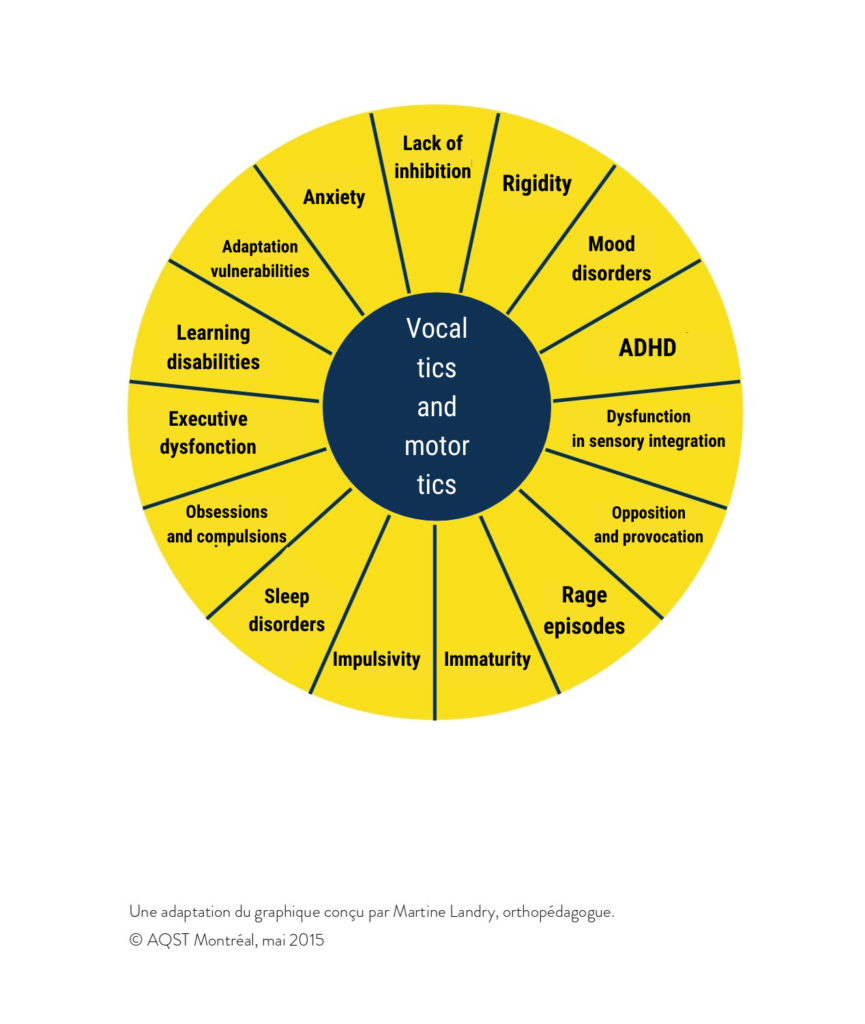Tourette syndrome
Symptoms
Tics
Tics are the visible symptoms of TS but it is not necessary the most difficult aspect to deal with. Other manifestations like learning disorders, behaviour difficulties or obsessions and compulsions can compromise the current and future quality of life of the person with TS.
People with TS do not control their tics, they generally feel a physical and psychological discomfort that can be eased only by the specific tic. We could compare this sensation to sneezing or itching.
Some people, generally adults, can suppress or modify their tics over a certain period of time going from a few minutes to a few hours. However, because that kind of control requires a lot of concentration and energy, it is not recommended for children.
In addition, after a certain period of tics suppression, there would be a more intense period of tics, as if the body would compensate for the period of absence – as if there was a sort of predetermined number of tics that the body needed to express
 Tics can be motor (muscular contractions) or vocal (mouth or nose noises). There are simple, complex and organized tics. Simple tics are quick, short and without significance. Complex tics are generally more elaborate, using a sequence of movements and can seem voluntary even if they are not.
Tics can be motor (muscular contractions) or vocal (mouth or nose noises). There are simple, complex and organized tics. Simple tics are quick, short and without significance. Complex tics are generally more elaborate, using a sequence of movements and can seem voluntary even if they are not.
Clinical symptoms of TS tics
Motor tics
blinking, grimacing, body contractions
Vocal tics
Mouth or nose noises, whistling, barking, rude or vulgar verbalizations
Tics localization
Face: 95%
Head, neck and shoulders: 90%
Other parts of the body: 40 to 80%
Exemple of motor tics
Simple
Blinking, grimacing and other facial movements, nodding, rolling of shoulders, neck stretching, etc.
Complex
Sudden movements, touching objects, sniffing hands or objects, jittering, spitting, hitting, kicking, squatting, etc.
Organized
Sequence of ritualized movements
Echopraxia
Imitation of somebody else’s movements
Copropraxia
Obscene movements (two finger gesture), obscene touching or sexual innuendos
Examples of vocal tics
Simple
Sniffing, grunting, throat clearing, coughing, whistling, other inarticulate sounds, etc.
Complex
Barking, explosive sound eruptions, etc.
Organized
Complete words, phrases, or sentences
Echolalia (40%)
Repeating somebody else’s words or syllables
Coprolalia (10%)
Using rude or obscene language
Palilalia
Repeating own’s words or syllables
Factors that will enhance tics
- Stress
- Anxiety
- Boredom
- Fatigue
- Excitement
- Stress
Factors that will reduce tics
- Sleep
- Orgasms
- Fever
- Relaxation
- Concentration